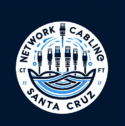Which Cable Is Used for High-Speed Internet? A Complete Guide
If you’re wondering which cable is used for high-speed internet, you’re not alone. With so many options available — from Ethernet cables to fiber optics — it can be confusing to know which one delivers the fastest and most reliable connection for your home or business.
Choosing the right internet cable depends on your setup, budget, and performance needs. Let’s break down the most common types of internet cables, how they differ, and which one is best for high-speed connections. Our team of structured cabling experts in Santa Cruz ensures that homes and businesses get the fastest and most reliable network connections.
What Is an Internet Cable?
An internet cable is the physical medium that connects your devices to the network — either directly through your router or via a structured cabling system. These cables transmit data between your computer, modem, or network switch to deliver stable internet access.
There are three main types of cables used for high-speed internet:
- Ethernet cables (Cat5e, Cat6, Cat6a, Cat7, Cat8)
- Fiber optic cables
- Coaxial cables
Each type has unique advantages depending on speed requirements, distance, and usage.
Ethernet Cables: The Most Common Option
For most homes and offices, Ethernet cables are the standard for wired internet connections. They’re cost-effective, easy to install, and deliver fast, stable performance.
Here’s a quick look at the most popular Ethernet cable types:
| Cable Type | Maximum Speed | Maximum Distance | Best For |
|---|---|---|---|
| Cat5e | Up to 1 Gbps | 100 meters | Basic home or small office networks |
| Cat6 | Up to 10 Gbps | 55 meters | High-speed home or office connections |
| Cat6a | Up to 10 Gbps | 100 meters | Commercial and enterprise networks |
| Cat7 | Up to 10 Gbps+ | 100 meters | Data centers, advanced installations |
| Cat8 | Up to 40 Gbps | 30 meters | Specialized, high-performance networks |
CAT6 and CAT6a cables are the most widely used today for high-speed internet. They offer fast speeds, minimal interference, and excellent performance for both residential and commercial applications.
Fiber Optic Cables: The Fastest Option Available
If you need the fastest possible internet speeds, fiber optic cables are the top choice. Instead of using electrical signals like Ethernet, fiber uses light to transmit data — making it faster and more reliable over long distances.
Fiber optic cables come in two main types:
- Single-mode fiber (SMF) – Used for long-distance and high-bandwidth connections, such as in data centers or ISPs.
- Multimode fiber (MMF) – Ideal for shorter runs within buildings, like between servers and network switches.
Fiber optics can reach speeds up to 100 Gbps or more, with almost no signal loss. However, installation costs are typically higher compared to Ethernet.
Coaxial Cables: Common in Home Internet
Coaxial cables are another common medium used by many internet service providers (ISPs) — especially for cable internet connections.
While coaxial isn’t as fast as Ethernet or fiber, it’s still widely used because of its existing infrastructure and reliability. With technologies like DOCSIS 3.1, coaxial cables can support speeds up to 1–2 Gbps, which is sufficient for most households.
Comparing Internet Cable Types
Here’s how these cables stack up in key areas:
| Feature | Ethernet | Fiber Optic | Coaxial |
|---|---|---|---|
| Speed | Up to 40 Gbps (Cat8) | 100 Gbps+ | Up to 2 Gbps |
| Distance | Up to 100 meters | Several kilometers | Up to 500 meters |
| Cost | Moderate | Higher | Low |
| Installation | Simple | Complex | Simple |
| Best For | Homes, offices | Enterprises, ISPs | Residential cable internet |
If you need reliable high-speed internet for your home or business, CAT6 or CAT6a Ethernet cables are the best balance between speed, cost, and performance. While several cable types are available, it’s important to know which cable is mostly used in making a network to ensure compatibility and performance.
Factors to Consider When Choosing a High-Speed Cable
Before installing a new cable, consider:
- Internet speed from your provider – Match your cable to your service speed.
- Distance between devices – Longer runs may need fiber or shielded Ethernet.
- Interference – Environments with heavy electrical noise benefit from shielded cables.
- Future-proofing – Upgrading to CAT6a or fiber ensures you’re ready for faster internet in the future.
Why Professional Installation Matters
Even the best cables won’t perform well if they’re not installed correctly. Professional network cabling installers ensure your system meets performance standards, minimizes interference, and complies with local electrical codes.
Certified installers test every connection to guarantee maximum speed and reliability — whether you’re wiring a small office or a large commercial facility. If speed is your top priority, check out what the fastest network cable is and how it can improve your internet performance.
Conclusion: The Best Cable for High-Speed Internet
The right cable depends on your needs:
- CAT6/CAT6a Ethernet for most homes and small businesses
- Fiber optic for enterprise-level performance or large facilities
- Coaxial for budget-friendly residential setups
For the best results, invest in quality materials and professional installation. Your network’s performance — and your productivity — depend on it.
